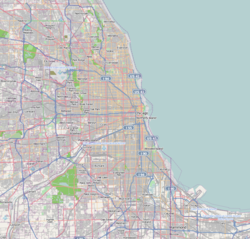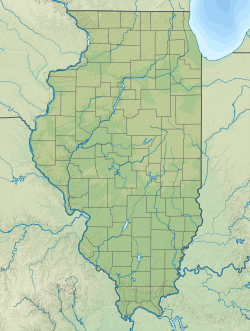Schiller Park, Illinois
Schiller Park, Illinois | |
|---|---|
 | |
| Motto: "Small Town Feel With a World at Its Touch" | |
 Location of Schiller Park in Cook County, Illinois. | |
| Coordinates: 41°57′22″N 87°52′14″W / 41.95611°N 87.87056°W | |
| Country | United States |
| State | Illinois |
| County | Cook |
| Township | Leyden |
| Area | |
• Total | 2.77 sq mi (7.17 km2) |
| • Land | 2.77 sq mi (7.17 km2) |
| • Water | 0.00 sq mi (0.00 km2) |
| Population (2020) | |
• Total | 11,709 |
| • Density | 4,227.08/sq mi (1,632.30/km2) |
| Time zone | UTC-6 (CST) |
| • Summer (DST) | UTC-5 (CDT) |
| ZIP Code(s) | 60176 |
| Area codes | 847 & 224 |
| FIPS code | 17-68081 |
| Website | www |
Schiller Park is a village in Leyden Township, Cook County, Illinois, United States. The population was 11,709 at the 2020 census.[2]
Geography
[edit]According to the 2010 census, Schiller Park has a total area of 2.77 square miles (7.17 km2), all land.[3]
Demographics
[edit]| Census | Pop. | Note | %± |
|---|---|---|---|
| 1920 | 390 | — | |
| 1930 | 709 | 81.8% | |
| 1940 | 804 | 13.4% | |
| 1950 | 1,384 | 72.1% | |
| 1960 | 5,687 | 310.9% | |
| 1970 | 12,712 | 123.5% | |
| 1980 | 11,458 | −9.9% | |
| 1990 | 11,189 | −2.3% | |
| 2000 | 11,850 | 5.9% | |
| 2010 | 11,793 | −0.5% | |
| 2020 | 11,709 | −0.7% | |
| U.S. Decennial Census[4] | |||
| Race / Ethnicity (NH = Non-Hispanic) | Pop 2000[5] | Pop 2010[6] | Pop 2020[7] | % 2000 | % 2010 | % 2020 |
|---|---|---|---|---|---|---|
| White alone (NH) | 8,169 | 7,935 | 6,892 | 68.94% | 67.29% | 58.86% |
| Black or African American alone (NH) | 211 | 189 | 164 | 1.78% | 1.60% | 1.40% |
| Native American or Alaska Native alone (NH) | 15 | 21 | 11 | 0.13% | 0.18% | 0.09% |
| Asian alone (NH) | 598 | 691 | 803 | 5.05% | 5.86% | 6.86% |
| Pacific Islander alone (NH) | 2 | 0 | 0 | 0.02% | 0.00% | 0.00% |
| Other race alone (NH) | 22 | 23 | 22 | 0.19% | 0.20% | 0.19% |
| Mixed race or Multiracial (NH) | 235 | 91 | 188 | 1.98% | 0.77% | 1.61% |
| Hispanic or Latino (any race) | 2,598 | 2,843 | 3,629 | 21.92% | 24.11% | 30.99% |
| Total | 11,850 | 11,793 | 11,709 | 100.00% | 100.00% | 100.00% |
As of the 2020 census[2] there were 11,709 people, 4,437 households, and 3,105 families residing in the village. The population density was 4,227.08 inhabitants per square mile (1,632.08/km2). There were 4,709 housing units at an average density of 1,700.00 per square mile (656.37/km2). The racial makeup of the village was 64.45% White, 1.67% African American, 1.43% Native American, 7.01% Asian, 0.03% Pacific Islander, 14.63% from other races, and 10.79% from two or more races. Hispanic or Latino of any race were 30.99% of the population.
There were 4,437 households, out of which 27.5% had children under the age of 18 living with them, 49.36% were married couples living together, 9.13% had a female householder with no husband present, and 30.02% were non-families. 24.39% of all households were made up of individuals, and 6.22% had someone living alone who was 65 years of age or older. The average household size was 3.13 and the average family size was 2.59.
The village's age distribution consisted of 21.3% under the age of 18, 8.1% from 18 to 24, 25.6% from 25 to 44, 28.5% from 45 to 64, and 16.5% who were 65 years of age or older. The median age was 41.6 years. For every 100 females, there were 113.3 males. For every 100 females age 18 and over, there were 117.3 males.
The median income for a household in the village was $58,637, and the median income for a family was $72,034. Males had a median income of $42,821 versus $35,103 for females. The per capita income for the village was $30,168. About 9.3% of families and 12.3% of the population were below the poverty line, including 26.3% of those under age 18 and 6.6% of those age 65 or over.
Education
[edit]This section needs expansion. You can help by adding to it. (May 2020) |
Schiller Park School District 81 operates public schools.
The Roman Catholic Archdiocese of Chicago operates Catholic schools. St. Maria Goretti School was in Schiller Park. From circa 2017 to 2020 the student population declined by 73. The archdiocese stated that the school could remain open if it had 150 students for 2019–2020, but the student population was below that. The archdiocese closed the school in June 2020.[8]
Transportation
[edit]The Schiller Park station provides Metra commuter rail service along the North Central Service Line. Trains travel east to Chicago Union Station, and north to Antioch station. Bus service in the village is provided by Pace.[9]
Sister cities
[edit] Capurso (Italy), 1994
Capurso (Italy), 1994
Notable people
[edit]- Edward Bluthardt (1916–1993), Illinois state representative and lawyer; Bluthardt served as mayor of Schiller Park.[10]
See also
[edit]References
[edit]- ^ "2020 U.S. Gazetteer Files". United States Census Bureau. Retrieved March 15, 2022.
- ^ a b "Explore Census Data". data.census.gov. Retrieved June 28, 2022.
- ^ "G001 – Geographic Identifiers – 2010 Census Summary File 1". United States Census Bureau. Archived from the original on February 13, 2020. Retrieved December 25, 2015.
- ^ "Census of Population and Housing". Census.gov. Retrieved June 4, 2015.
- ^ "P004: Hispanic or Latino, and Not Hispanic or Latino by Race – 2000: DEC Summary File 1 – Schiller Park village, Illinois". United States Census Bureau. Retrieved January 26, 2024.
- ^ "P2: Hispanic or Latino, and Not Hispanic or Latino by Race – 2010: DEC Redistricting Data (PL 94-171) – Schiller Park village, Illinois". United States Census Bureau. Retrieved January 26, 2024.
- ^ "P2: Hispanic or Latino, and Not Hispanic or Latino by Race – 2020: DEC Redistricting Data (PL 94-171) – Schiller Park village, Illinois". United States Census Bureau. Retrieved January 26, 2024.
- ^ "Five Archdiocese of Chicago Catholic schools will close". Chicago Catholic. January 22, 2020. Retrieved May 8, 2020. – Spanish version
- ^ "RTA System Map" (PDF). Retrieved February 1, 2024.
- ^ 'Illinois Blue Book 1981–1982,' Biographical Sketch of Edward E. Bluthardt, pg. 79





